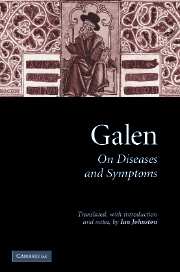Book contents
- Frontmatter
- Contents
- List of tables
- Acknowledgements
- List of abbreviations
- PART I INTRODUCTION
- I.1 General introduction
- I.2 Galen's life and works
- I.3 Galen's philosophical and medical antecedents
- I.4 Definitions and terminology
- I.5 The classification of diseases and symptoms
- I.6 Causation in diseases and symptoms
- PART II TRANSLATION
- PART III CONCLUSION
- Bibliography
- Index
I.4 - Definitions and terminology
Published online by Cambridge University Press: 22 September 2009
- Frontmatter
- Contents
- List of tables
- Acknowledgements
- List of abbreviations
- PART I INTRODUCTION
- I.1 General introduction
- I.2 Galen's life and works
- I.3 Galen's philosophical and medical antecedents
- I.4 Definitions and terminology
- I.5 The classification of diseases and symptoms
- I.6 Causation in diseases and symptoms
- PART II TRANSLATION
- PART III CONCLUSION
- Bibliography
- Index
Summary
This chapter is divided into four sections. In the first of these, four groups of key terms, foundational for Galen's analysis of the classification and causation of diseases and symptoms, are considered. These are (i) ὑγίεια, νόσος, and νόσημα; (ii) πάθος, πάθημα, σύμπτωμα and ἐπιγέννημα; (iii) διάθ∊σις, ἕξις and κατασκ∊υή; (iv) δύναμις, ἐνέργ∊ια and ἔργον. In the second section, terms specifically related to causation (αἰτία, αἴτιον, πρόϕασις and the various qualifying terms) are discussed, with particular focus on Galen's usage in the four treatises under examination. The third section comprises a miscellany of other terms important in the translated treatises. In the fourth and final section a glossary of medical terms used in the treatises is provided. The aim in all four sections is to clarify Galen's own usage. Although in the four treatises being considered and elsewhere, Galen is disparaging about those who he considers waste their time and energies on fruitless terminological debate, it is nonetheless clear that definitions are critical to Galen's enterprise in these four treatises, as the space he devotes to the discussion of such matters indicates. In De methodo medendi he also explicitly acknowledges their importance thus: ‘And it is shown in those [writings] that the origins of every demonstration are those things appearing to perception and intelligence and that in all things enquired into it is necessary to change the term (ὄνομα) into a definition (λόγος).’
- Type
- Chapter
- Information
- Galen: On Diseases and Symptoms , pp. 21 - 64Publisher: Cambridge University PressPrint publication year: 2006



